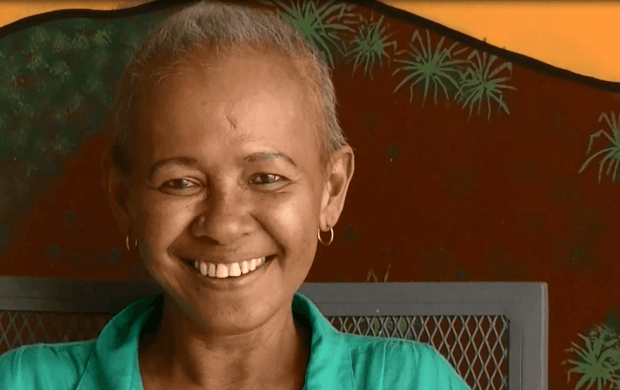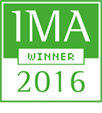Naomi’s Cancer Journey


Interview with Naomi Barba
In 2011 Naomi Barba was diagnosed with breast cancer. She underwent treatment including surgery, chemotherapy and radiation therapy at the Alan Walker Cancer Centre in Darwin.
Naomi is an Indigenous woman who lives in Nhulunbuy, a remote community in the Northern Territory.
Naomi produced a video with the Alan Walker Cancer Centre explaining her cancer journey.
Targeting Cancer spoke to Naomi about the video:
Why did you decide to produce this video?
I was approached by the Alan Walker Cancer Centre radiotherapy team asking if I was interested in making a video. I thought it would be really important to share my experience with the community, because we live in such a remote community, I could share my experience through that.
With Indigenous culture they tend to view the message that people are trying to promote rather than listen to it. So I thought this would be a great opportunity, not only to share it with the community where I live but create an awareness with my children, my girls, because the cancer may be hereditary. I wanted them to see the journey that they might face.
How did you find the treatment? What were you concerned about beforehand? What were the hardest things about it?
The hardest part of the treatment was being away from family and the financial difficulties; you have to give up work and all that sort of stuff.
I think also not being able to understand it at first, because you’re in complete shock. I found it really important to have a support person with me, that way they were able to ask the questions and listen to what the specialists were saying in regards to going through receiving the treatment.
Even from diagnosis I knew I had to have someone there for me. You don’t want to believe it and you try to ignore it and think, this isn’t going to happen, this should not be happening. All these thoughts are going through your mind. You’re not actually listening to what’s being said.
Treatment wise, I was fortunate to have the opportunity to go to Darwin for treatment. I couldn’t speak more highly of the Alan Walker Cancer Centre, it’s a new facility that has just been built. Years ago community patients used to have to go to Adelaide for treatment, now you only have to go to Darwin. It’s closer so you can have that family contact, in Adelaide you wouldn’t have much support.
The Alan Walker Cancer Centre were great, from the time you walk in, the warm welcoming that you get from the centre and seeing that they had an Indigenous support worker behind that counter. That person was there to support Indigenous community people, even through chemotherapy, the staff there were very supportive.
You mentioned that having a support person was important, is there anything else that you think is important?
You know what is really important, having that strong person or someone who is trained in that field who can be an escort to travel with remote community people. That is something that I found really difficult.
There is not enough training in understanding the different parts of the cancer journey, from the surgery, the follow up to surgery. I had to have mammograms, ultrasounds, biopsies and that is prior to surgery. To have someone, an Indigenous person, trained in that field so they can be the escort for that person would make a difference.
I found it really hard – my husband didn’t understand, my girlfriends didn’t understand, I didn’t understand but I needed someone that I could connect with, as an Indigenous person. I could go back to them and ask what’s going on, rather than coming home and researching it. Sometimes the stuff on the internet is not stuff you believe or it’s not the best information.
When I was first diagnosed I should have brought my husband with me. No one told me that. As I was sitting in the waiting room, I thought I should ring a friend because I thought, this news isn’t going to be good. So I rang my friend at the last minute and she came on board and helped me the whole time.
That mightn’t mean much to people but they are very important for my experience.
Perhaps I can jump forward to the radiation therapy, did you find any particular challenges for you either in accessing the therapy or coping with the treatment?
Not at the beginning, because it doesn’t have the effect like chemo, with radiotherapy it was something that you could see what was happening overtime, the changes within yourself. Because you’re doing the daily visits, if you have the concerns there is someone there to answer your questions. Whereas for the chemo I would fly to Darwin every 21 days, get treatment, then fly back to Nhulunbuy.
If I had concerns, I couldn’t go anywhere because the facility isn’t here. That was the big difference between chemo and radiotherapy.
I didn’t have any issues with radiotherapy, only after the treatment had already been done and I had accepted the change within my body and that was the closure in my journey that I had gone through. I dealt with it and I am here today telling my story.
It seems like that face to face contact is critical.
That’s right, in a remote community everyone works Monday to Friday, you don’t have the facilities there 24/7 so to speak. You are basically sitting, trying to work things out for yourself, it is really important to have the support staff.
In the video you spoke about deciding between traditional medicine and western medicine. Can you tell us more about that choice?
Living in the community where I do it is all about traditional medicine. You don’t really have the understanding of what the western treatment is all about. Our people don’t like to be in confined spaces, that was one issue in treatment, and you want to be on your homeland. Darwin belongs to another family, that was the big challenge that I had to face, making that decision.
But I made that decision that I would go through western medicine and allow them to understand that I am making the right choices and willing to take on traditional medicine after western medicine. That was very challenging. I just wanted them to understand and see that western medicine can make you better. It can be a struggle but you can get through it.
There are a whole range of cultural issues that impact on you when you need to go away to have treatment. I don’t think there is enough information out there for people to understand what the process of it all is.
Do you have any other advice for people?
Being Indigenous we need to make that step to overcome that attitude of shame, shame to speak about something especially with issues such as this. It’s not a shameful situation, it is really important.
The trauma that it causes within your family and friends and people that are your whole network, it is really important that we overcome that attitude.
When you say shame, you were talking about being aware of your body? Or the burden you might put on friends and family?
Yeah, it’s everything. It was shameful for me to walk around because everyone was so used to seeing me with my long hair. I was ashamed because I lost my hair. What would people think of me? Are they thinking that she is dying? You know, that attitude.
People need to make that step forward and make that change, don’t be embarrassed. Don’t be embarrassed to tell someone, go through that treatment and have those changes. Don’t be embarrassed to go and see your doctor, that is really important.
That’s the best advice I can tell people.



